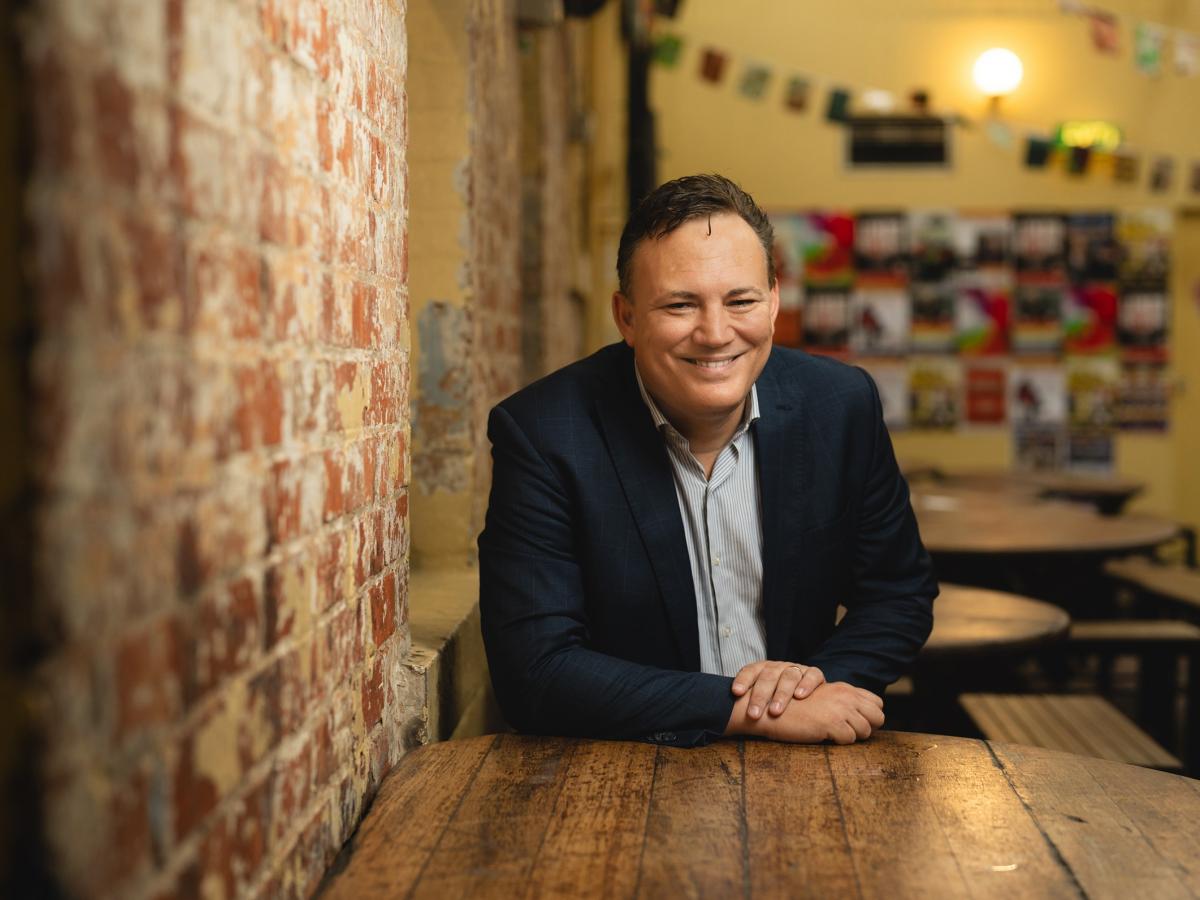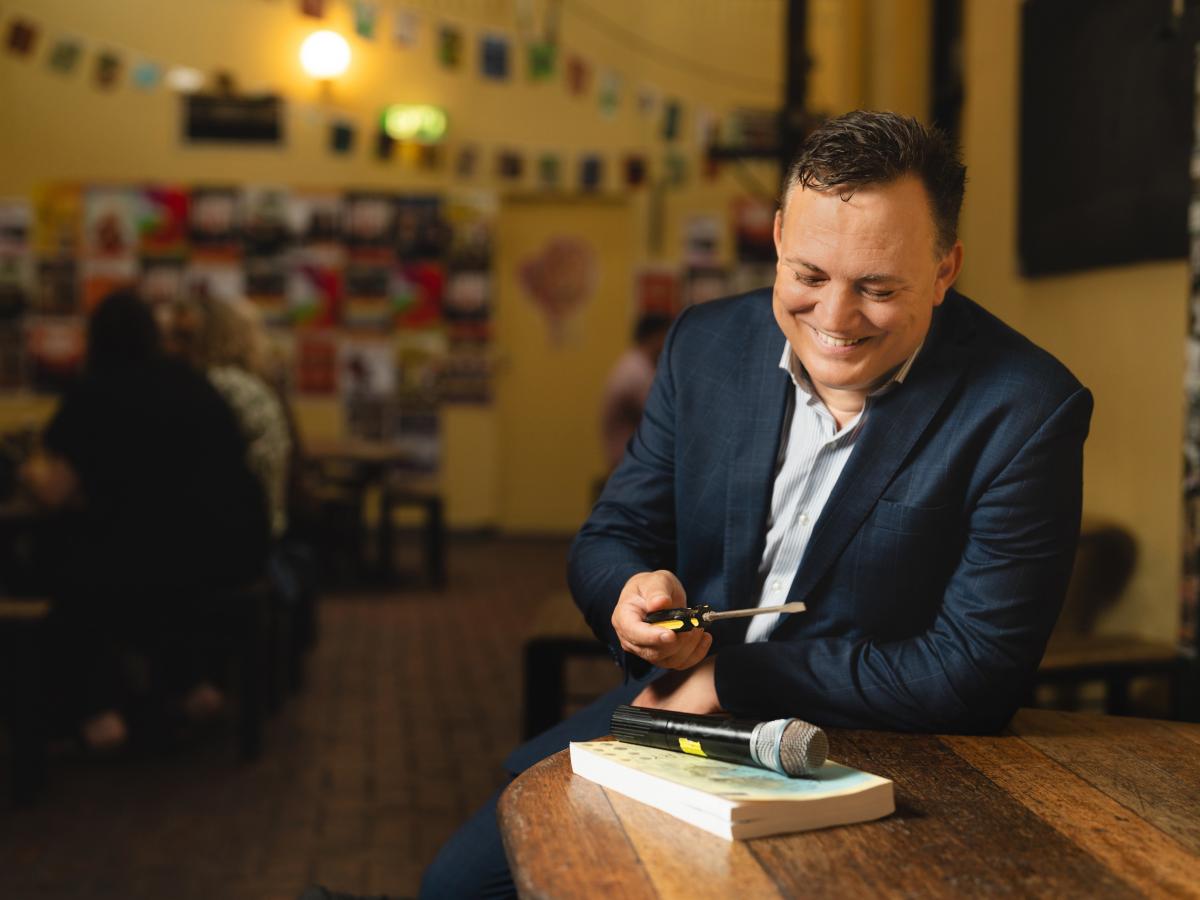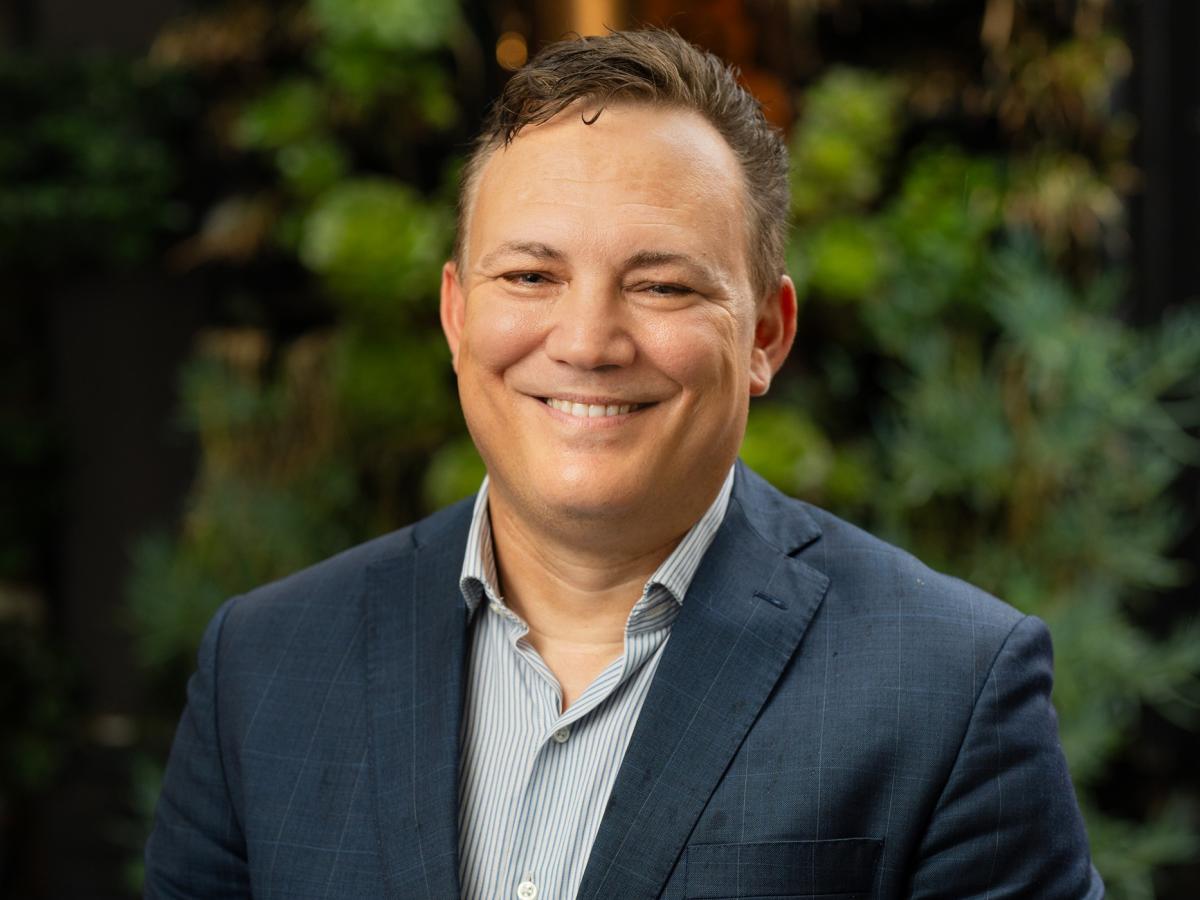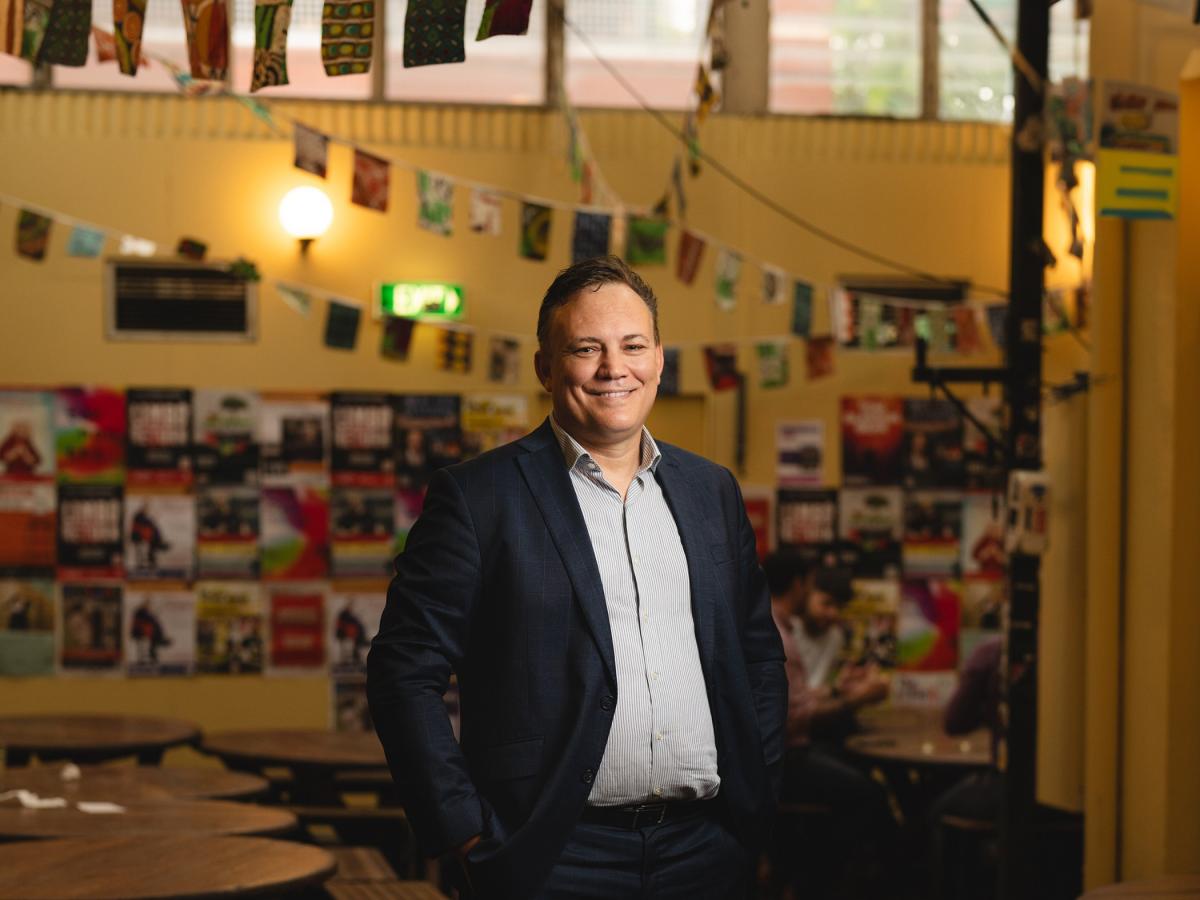Connected Conversations | Scott Clark

Scott Clark prefers to take the road less travelled and his remarkable journey to Associate Professor and Head of the Discipline of Psychiatry (among clinical roles) certainly came about via an unusual path that included leaving school after year 11, an electrical apprenticeship, singing in a cover band and a PhD alongside MBBS studies.
Please tell us your name and a little bit about yourself.
My name is Scott Clark. Im a father of two, a retired electrician, a part time singer and a dedicated clinical academic, driven to improve quality of life for marginalized people with serious mental illness through clinical practice and transformational, translational research into the biopsychosocial nature of mental illness.
Tell us a bit about your time at the University.
I am an Associate Professor, Head of the Discipline of Psychiatry and lead the Medical School’s teaching and research programs in Psychiatry. I also work as a Consultant Psychiatrist in Adult and Youth Community and Emergency services for the Central Adelaide Local Health Care Network (CALHN) at Western Community Mental Health and the Queen Elizabeth Hospital. I’ve been in a clinical academic role since 2013 just prior to gaining membership with the Royal Australian College of Psychiatry. I took over as Head of Discipline in 2019. In 2020, I was Course Coordinator for the clinical years of the MBBS (4-6) and oversaw the transition of the course to online and back as we dealt with the impact of pandemic lock downs and social distancing on clinical rotations. I have led the development of the statewide network for the management of clozapine treatment of schizophrenia – a highly effective antipsychotic drug with serious side effects – translating local studies of the epidemiology of clozapine associated adverse events to improve quality of care. Over the last two years I have implemented the CALHN Mental Health Research Community of Practice and the CALHN Clinician PhD Pathway both as chair.

I am privileged to lead an exceptional group of clinical academics, titleholders and scientists. As a team, the Discipline of Psychiatry maintains a focus on high quality teaching, leveraging digital technologies including virtual reality and AI. Over the last year we have systematically refreshed and restructured core content as we transition to the new medical program (MD). We also teach a specialised elective course in Biological Psychiatry that showcases our specific expertise in bioinformatics, molecular and clinical science. Our research program is focussed on the personalisation of mental health treatments using novel biological (proteomics, genomics), digital (imaging, electrophysiology, speech, facial expression) and clinical markers. We aim to better understand the mechanisms of illness, response and side effects to existing mental health treatments, while exploring the potential for novel interventions. We are part of national clinical trial networks including the Australian Early Psychosis Collaborative Consortium (AEPCC) and Mental Health Australia General Clinical Trials Network (MAGNET) and work with Pharma. Our focus is on clinical trials of novel treatments for serious mental illness (ketamine, cannabidiol, metabolic, virtual reality) which we run in own local clinical trial network across CALHN, NALHN and headspace Adelaide. We lead large scale analyses of open science databases such as the UK biobank and are part of the NHMRC Centre for Excellence for Psychosis Prediction (Pre-EMPT) and international consortia such as Conligen (genomic prediction of lithium response). Locally, we collaborate closely with the School of Electronic Engineering, the Adelaide Institute of Machine Learning, the Australian Centre for Precision Health (Uni SA) and the PARC clinical trials unit at the Royal Adelaide hospital. I am Co-Chair of the Fluid Biomarkers Committee for the US National Institutes of Health-Accelerated Medicines Program – Schizophrenia (AMP-schizophrenia), an international study of the biological, digital and clinical prediction of psychotic illness. We are collaborators in the European Union sponsored Intensify project which seeks to identify the molecular basis of treatment resistance in mood and psychotic illness. I recently established a partnership through the Nothingham-Adelaide Alliance to explore the relationships between novel magnetoencephalographic markers of brain function, diet, depression and our locally developed AI pipeIine for analysis of speech and facial expression. I am a Scientific Advisor for the Mental Health Foundation of Australia and a member of the Executive Committee for the Society of Mental Health Research (SMHR). Over the last 3 years through these collaborations we have been able to rapidly expand our staffing and expertise across these projects which are worth in excess of $50 Million.

What has been your journey to get where you are today?
I left school at the end of year 11 (Wirreanda) to complete an apprenticeship as an electrical fitter at Monroe Australia, learning to build and maintain complex industrial machinery. As a qualified electrician I completed studies in industrial electronics and programming. I completed the Flinders University Foundation Program and gained mature aged entry to the Flinders Bachelor of Science program at age 22. I majored in Psychology with strong components of Biology and Computing. I completed honours in Medical Science at the Flinders Centre for Neuroscience, in the Enteric neuroscience lab of Professor Marcello Costa, defining a novel purinergic ascending reflex in guinea pig ileum. I then gained merit-based transfer into the Adelaide MBBS program. My University studies were all self-funded by part-time work (electrical, retail, dissection for the Adelaide Anatomy department) and through playing in cover bands across Adelaide. However, by the end of third year I needed to return to full time work and took a job with the Health Informatics unit led by Dr Malcolm Pradhan. I began analysing the implementation of a Community Acquired Pneumonia guideline and subsequently turned this project into a PhD in Health Informatics. I completed this work alongside my MBBS studies and during postgraduate medical training and then took up a Clinical Academic role as Senior Lecturer for the Discipline of Psychiatry under Prof. Bernhard Baune. I subsequently translated my PhD work into psychosis prediction, earning the 2017 RANZCP Early Career Psychiatrist Award.
I stepped up to Deputy Head and then Head of Discipline under Professor Cherrie Galletly’s mentorship, gaining the skills required to successfully lead the Discipline through the COVID Pandemic.
What has been your career highlight, to date?
There have been a few. I guess to begin with, I’m grateful to have the opportunity for a clinical academic career coming from an alternative pathway. Otherwise, the 2017 RANZCP Early Career Psychiatrist Award, leading the successful implementation of the statewide Clozapine Quality Network and winning the SA Health improving patient safety award, leading the COVID response for the clinical years of the MBBS, engaging with national and international networks, gaining NHMRC, NIMH, and Welcome Trust funding to build our local programs, building a world class team of academics and clinicians with outreach into local clinical service and leading the implementation of the CALHN Clinician PHD Pathway and Mental Health Research Community of Practice.
What do you love most about working at the University of Adelaide?
Leading a team that provides high quality, innovative, education and translational research that impacts on the quality of mental health care, locally, nationally and internationally. We have all the key ingredients to link training, science and service for truly translational outcomes in mental health.
Who (or what) inspires you?
I’m inspired by the key figures in Australian mental health research such as Pat McGorry and Michael Burke and international clinician scientists such as John Kane, Christoph Correll, Oliver Howes and others. My mantra is “training is science, is service” – we can best drive innovation in clinical practice by integrating research into clinical training. Though the MBBS, the CALHN-based clinical PhD program and our Mental Health Research Community of Practice I am striving to set an international benchmark for integration and forwards/backwards translation. My goal is that we develop a closed loop to use pre-clinical studies, health service data and trials in service to drive innovation and continuous improvement of outcomes for people with severe mental illness.
What is one of the best decisions you have ever made? Or–if it’s more interesting!–one of the worst?
Both my best and worst decisions are never giving up on a good idea. Recently we published in Lancet Psychiatry on a large Pharma data set that took ten years, three companies and countless failed negotiations. This analysis lays the groundwork for international changes to clozapine monitoring to improve outcomes for patients with psychosis. We are now working with Pharma to change Australian regulations which will take further long-term negotiations.

What is your favourite thing about living in Adelaide?
I love live music and in earlier days was part of the local Indy and cover band scene as a singer. Adelaide has a great creative Arts culture and I really enjoyed immersing myself in writing and performing alongside my studies. These days as father of two primary school aged kids, life is a little more sedentary, but I still get out to festivals and gigs and even jam with a few bands when I can (always looking forward to the next gig).
What’s something that people are surprised to find out about you?
I still have my electrical licence. I was cast from head to foot by the Adelaide Anatomy department for a range of military crash test dummies for NATO (AUSMAN) that featured on the ABC Quantum program in the 1990s. My effigies have repeatedly been blast tested ever since.
What do you hope to be doing in 10 years’ time?
Leading the introduction of personalised first line effective treatments for people with serious mental illness in translational networks that optimise local service and build evidence through local registries and international collaboration.
If you had to give a TED Talk about something unrelated to your work, what would you speak about?
Taking the path less travelled.
